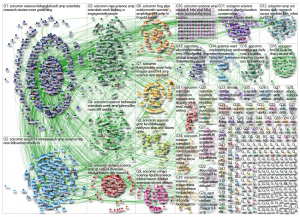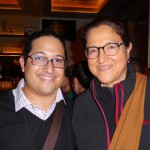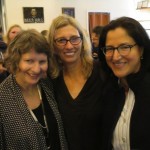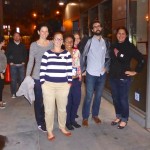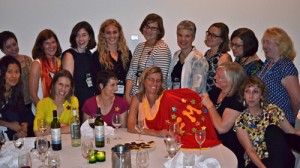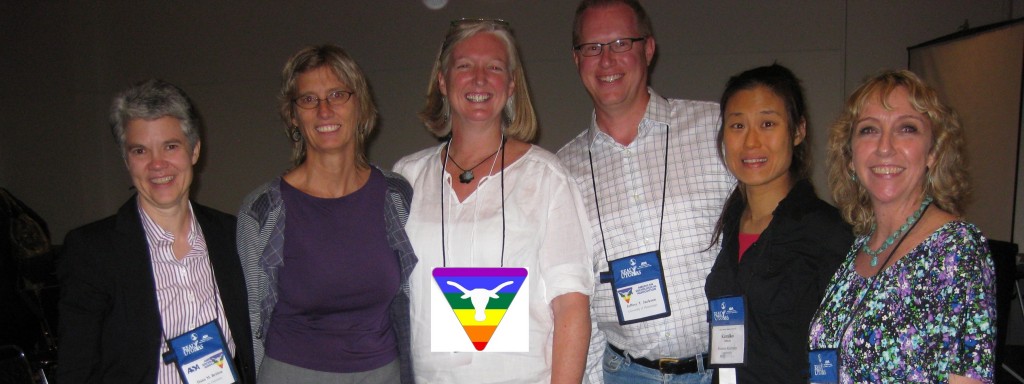Sexualities in the Modern World? @UTAustinSOC says yes, in a big way. While our faculty, graduate students and alumni always represent at ASA, Longhorns will steer this year’s sexualities’ conversation in many directions. In glancing over the schedule, I found 82 presentations and table sessions and I’m sure there are more. I include a few of our graduate student presenters below.
Anima Adjepong
“I Want Ghana to Continue to Live in the United States”: Cultural Identity among Second generation Ghanaian immigrants
Claims about the absence of transnational activities among second-generation immigrants do not often consider how racialization shapes these processes. This paper examines the extent to which the U.S.-born children of Ghanaian immigrants participate in a “transnational social field” (Glick-Schiller 2005; Levitt and Glick-Schiller 2004) where they simultaneously engage in Ghanaian life and culture, while fully immersed in American life. Ethnographic investigation of an organization that comprises 1.5- (foreign-born immigrants who moved to the United States prior to or during adolescence and attended school here) and second-generation Ghanaians in Houston, Texas leads me to ask why a group of ostensibly American youth would so strongly identify as Ghanaians. This ethnography examines the ways in which identifying with Ghana and as Ghanaians helps these mostly U.S.-raised youth make sense of their difference as racialized Americans and foreign Ghanaians.
Shantel Gabrieal Buggs
‘Your Momma Is Day-Glow White’: Questioning The Politics Of Racial Identity, Loyalty, And Obligation
This article utilizes discourse analysis and an autoethnographic approach to explore the impact of U.S. racial and ethnic categorization on the experiences of an individual marked as ‘mixed-race’ in terms of individual identity and familial/cultural group loyalty and obligation(s). This essay focuses on an incidence of public policing through the popular social networking platform Facebook, centering on the invocation of racial obligation by white friends and family members. I analyze how racial loyalty is articulated by friends and family members in their posts on my personal Facebook page and how this ‘loyalty’ is used as means of regulating my mixed-race identity performance. This essay aims to understand several things, namely how identity is mediated through the invocation of racial obligation and how tension around identity plays out in the multiracial family.
Caity Collins
Work-Family Policies And Working Mothers: A Comparative Study Of Germany, Sweden, Italy, And The United States
Despite women’s common struggles to balance motherhood and employment, western countries have responded with drastically different work-family policies. Drawing on 100 in-depth interviews and field observation with middle-income working mothers in Germany, Sweden, Italy, and the United States, I examine how different ideals of gender, motherhood, and employment are reflected in and reinforced by the work-family policy regimes of these four countries. Given these different policy regimes, I investigate how working mothers negotiate the constraints and opportunities facing them daily as they balance motherhood and employment. Depending on a country’s level of policy support for women’s employment and caregiving, I observed variation in (1) how closely mothers identify with their policy regime’s ideal of motherhood and the “ideal worker,” and (2) the extent to which they experience guilt and tension about their identities as a mother and a worker. This is the first comparative study to incorporate mothers’ voices into the scholarly debates about the relationship between gender inequality and work-family policy around the world. Understanding women’s perspectives about what works – and what hinders – their achievement of work-family balance should be central to any scholarly endeavor to craft, advocate for, and implement work-family policy as a force for social change.
Elizabeth Cozzolino and Christine L. Williams
Child Support Queens and Disappointing Dads: Gender and Child Support Compliance
Despite increased spending on child support enforcement in the U.S. over the past 30 years, child support collections remain around 40%. Existing literature focuses on three main explanations for this low compliance: poor enforcement, inability to pay, and unwillingness to pay. These explanations either neglect gender or rely on outdated assumptions about gender. Our analysis of in-depth interviews with 21 members of separated families reveals two controlling images of separated parenthood—the child support queen and the disappointing dad—that may help explain the underpayment of child support. In a reversal of traditional parenting roles, we find that separated mothers are now evaluated on their ability to financially provide for their children while separated fathers are evaluated on the time and care that they provide. We argue that these changing expectations of fatherhood and motherhood may contribute to men’s unwillingness to pay child support and women’s reluctance to demand compliance.
Rachel Donnelly
Intergenerational Changes and Health: the Effects of Downward Educational Mobility
A clear majority of high school graduates in the United States decide to enroll in college. In addition to many economic benefits, higher levels of education create opportunities for better health. Social stratification by education creates inequalities in education and health that are socially reproduced within families. Given the context of educational expansion in the United States, this study used data from the General Social Survey to explore the detriments to self-rated health when adult children receive less education than their parents and how these detriments differ by sex and race/ethnicity. Binomial logistic regression models of self-rated health indicated that an individual completing less years of education than his/her mother (downward intergenerational educational mobility) increases the likelihood of reporting fair or poor health. In an era where an increasing number of Americans are completing higher levels of education, these findings illustrate the detrimental effects on health for those who are left behind.
Marc Garcia
Prevalence and Trends in Morbidity and Disability among Mexican American Elders in the Southwestern United States, 1993-2011
The aim of this study was to examine trends in morbidity and disability among elderly Mexican Americans residing in the southwestern United States. Seventeen-year panel data from the Hispanic Established Population for the Epidemiological Study of the Elderly were used to make detailed comparisons specific to nativity, gender and five-year age groups. Results show that foreign-born and U.S.-born Mexican Americans, with a few exceptions, have similar prevalence rates for morbidity regardless of gender. Conversely, IADL prevalence is higher for foreign-born women. Nativity is found to be a significant predictor of IADL disability for females and ADL disability for males. The differences we report have important implications for health services and health policy. Given the rapid aging of the Mexican American population, the prevention and treatment of medical conditions and disabilities, particularly among the foreign-born should be a major public health priority to reduce ADL and IADL dependence in the community.
Erika Grajeda
A “Safe Space” for Undocumented Immigrant Workers?: The Case of the San Francisco Day Labor Program and Women’s Collective
In the U.S., more than 117,600 immigrant, displaced, and homeless workers gather daily in public settings such as street corners, storefronts, and in recent years, worker centers, to procure “off-the books” employment. While “informal” or unregulated hiring sites have long been a common feature of the urban landscape, day labor worker centers represent a new organizational model that emerged in recent years to halt the exploitative practices associated with curbside hiring. Worker centers are thus said to represent a “safe space” for marginalized immigrant workers, particularly a growing number of women who are turning to these organizations to secure employment. While these immigrant organizations are increasingly taking on the role of labor market intermediary, creating recognizable day labor markets and sorting low-wage workers into the world of work in the U.S., they have been largely overlooked by scholars. This article examines new (day) labor organizing in the Latin American immigrant community through an ethnographic case study of the San Francisco Day Labor Program and Women’s Collective (SFDLP-WC). Through participant observation and semi-structured interviews with SFDLP-WC staff, members, and volunteers, I show that assumptions about gender difference are encoded into the worker center’s organizational practices, ideologies, and distributions of power, ultimately placing undue burden on the women members. I find that while worker centers are purported to be “safe havens” for undocumented workers, particularly women, they may actually reproduce existing structures of gender, race, and class inequality.
Pamela Neumann
“Rutas y Desvios: Gender-based Violence, Bureaucratic Practices and (in)Justice in Nicaragua”
In Nicaragua, like other countries in Latin America, women’s police stations serve as the critical first point of contact with the state for women experiencing various forms of domestic violence. With the passage of Law 779 (Ley Integral contra la Violencia hacia las Mujeres) in 2012, new requirements, such as prohibiting mediation and detaining suspected offenders, were introduced. A year later, Law 779 was reformed to permit mediation again under limited circumstances. Then, in August 2014, Nicaragua’s President Ortega signed an executive decree altering Law 779 to incorporate the involvement of community-level “Gabinetes de Familia” in the resolution of certain domestic violence cases. Drawing on participant observation in women’s police stations and in-depth interviews with women victims, this paper analyzes the relationship between these legal and political developments and the everyday interactions that women have with police. In doing so, it highlights both the constraints of local state actors embedded in a web of partisan bureaucracy as well as their agentic role in shaping different women’s ability to access legal justice in domestic violence cases.
Cristian Paredes
Attendance at Museums and Live Theaters: Ethnic Disparities in Highbrow Out-of-the-House Leisure Consumption in Houston
Dynamics of compensation for the deprivations of segregation and discrimination, and the support of multiculturalism derived from ethnic cohesion explain the consumption of out-of-home highbrow leisure events by minority/ethnic individuals, immigrants, and their descendants as efforts toward their integration and assimilation in metropolitan areas. Using data from the Houston Area Survey, I examine whether there are any significant ethnic disparities in the attendance at museums and live theatres, which represent a relevant dimension of out-of-home highbrow leisure in Houston. I found that the odds of frequently attending museums and live theatres are lower for Anglos compared with non-Anglos, and higher for U.S.-born individuals with at least one foreign parent compared with U.S.-born individuals with U.S.-born parents. These findings reveal that the audiences of museums and live theatres in Houston are already characterized by a noteworthy ethnic diversity.
Marcos Perez
What About my Parents? Three Dilemmas of a Community-Based Campus Organization.
Based on a year of ethnographic research on a large organization of undocumented college students, this paper explores the contradictions experienced by activists in one of today’s most important social movements in the United States: the DREAMers. I argue that the dual nature of the organization under study, which is both community-grounded and campus-based, generates three dilemmas that severely affect the group and its members. The first dilemma concerns the organization’s goals, and is experienced as the hard choice between focusing on the needs of undocumented students and pursuing a more inclusive agenda that incorporates their families. The second dilemma is related to the organization’s mobilizing structures, and is caused by its strong ties to the local Latino community, which provides many types of resources but at the same time hinders the group’s appeal to other ethnic and national groups. Finally, the third dilemma stems from the clash between the member’s own identities as hard-working Americans and their experiences of exclusion and discrimination. I describe how these contradictions generate tensions among activists and how they complicate the relations with allied organizations. I also discuss how my findings apply to the nation-wide immigration reform movement. I conclude by exploring how the three dilemmas might shed light on the challenges currently faced by immigrant communities in the United States.
Juan Portillo
Is there really a “female advantage” in higher education? Reconceptualizing the “boy crisis” in education
A topic that dominates education these days is the “crisis” faced by boys’ due to underachievement relative to girls in education. In her best selling book, The War Against Boys: How misguided feminism is harming our young men (2001), Christina Hoff Sommers writes that “it’s a bad time to be a boy in America” (p. 13). She claims that misguided efforts of feminist and women’s groups have resulted in pathologizing boys and men, leading boys to be shut out of educational attainment because of teachers’ perceptions of their “bad behavior” compared to girls’ “good behavior.” This sentiment is accentuated in higher education, as scholars and others are alarmed over an apparent “dominance” of women, who earn a larger proportion of college degrees than men. However, it is not statistics but rather: (a) moral claims about discrimination against boys (particularly boys of color); and (b) a “female advantage” that is to blame for boys’ “disadvantage,” which are misguidedly at the root of most scholarly work done on this topic. In this paper, I will address current understandings of a “boys’ educational crisis” and show that it is a dangerous framing that follows heteropatriarchal logics without challenging gender norms. I argue that: (1) Men of color can easily fall into the trap of speaking ONLY from personal experience, blinding them to the way in which masculinity and male privilege also shape their experiences and their relative disadvantage; (2) A dichotomy that reproduces male dominance is re-created, disguised as “true equality.”
Brandon Robinson
Doing Sexual Responsibility: Gay Men Navigating HIV Online
In this article, the author draws on 15 in-depth interviews with self-identified HIV negative gay men who use Adam4Adam.com for sexual purposes. The author examines how HIV discourses influence these men’s lives as they navigate their intimate and sexual relationships in cyberspace, and the author introduces the concept of doing sexual responsibility to illuminate how managing sexual health, HIV, and risk plays out on the interactional level within gay men’s online encounters. Specifically, the author shows how these men use the website interface to screen other users for HIV and how these men disclose one’s own status and safe sex practices. The author also exposes how these practices lead to the stigmatization of HIV positive individuals on the website. Lastly, the author uncovers how trust can lead to a contradiction of how gay men feel they should act and how they do act in certain sexual encounters. The author concludes that new ways of discussing sexuality, HIV, and sexual health need to be engendered.
Luis Romero
“From La Migra to El Amigo: The INS Campaign to Befriend Undocumented Immigrants during IRCA”
Before the passage of the 1986 Immigration Reform and Control Act (IRCA), the relationship between undocumented immigrants and the Immigration and Naturalization Service (INS) was highly antagonistic. Undocumented immigrants were distrustful of the immigration service due to its deportation mission that implemented deceitful tactics, including using children to lure their undocumented parents and sending letters to immigrants promising legalization only to deport them once they arrived to INS offices. However, this changed for a brief period after the passage of IRCA when INS transformed its image in the eyes of immigrants and became their amigo – their friend. INS accomplished this by engaging in a furious public relations campaign and training their staff to be supportive of immigrants as they applied for legal status – unprecedented measures for an agency that was set on deporting immigrants. This paper explains why INS, an organization that was defined by its enforcement duties and attempted to push out undocumented migrants, became an organization that altered its mission during IRCA to help undocumented migrants gain legal status. The author differs from other explanations of INS’ behavior during IRCA by extending interest-convergence theory and the implications that converging interests have on undocumented immigrants and racial minorities. Using a historical and content analysis of INS interviews, government documents and independent reports, the author expands interest-convergence theory to examine INS’ motivations for helping undocumented immigrants and transforming from the antagonistic migra to their amigo.
Connor Sheehan
Race and Ethnic Differences in Reconstructing Childhood Health
Using the Health and Retirement Survey (n = 9,696) we analyze how race/ethnic disparities in retrospective ratings of child health and current levels of functional limitations are influenced by controls for specific sets of childhood health and socioeconomic conditions. This research is important because the lifecourse framework has become reliant on retrospective measures to operationalize child health. Generally, it’s assumed that reports of childhood health, socioeconomic status and diseases operate similarly across racial and ethnic groups, a questionable supposition considering substantial stratification in life experiences and access to medical care. Indeed, we find considerable race/ethnic differences in retrospective reports of child health with Blacks and Hispanics having higher odds of “fair/poor” child health than Whites. These differences are strengthened when childhood diseases are controlled for, and mediated when socioeconomic conditions are controlled. The lack of access to the health care system likely leads to underreporting of specific childhood conditions among minorities which leads to a suppressor effect when childhood diseases are controlled. Results from negative binomial models predicting the current number of functional limitations largely echo, albeit less strongly, the findings from the retrospective measures. Our results suggest that race/ethnic health disparities begin in childhood but also that childhood health is appraised differently between race/ethnic groups. Due to the observed differences, future life course work should use more general measures of child health than specific when exploring the origins of health disparities.
Chelsea Smith
Change Over Time in Attitudes about Abortion Laws Relative to Recent Restrictions in Texas
Recent laws and regulations in the state of Texas have severely restricted access to abortion care; however, less is known about public opinion regarding such legislation. This study used the Houston Area Survey to investigate attitudes about abortion laws in 2009 (n = 1,393) and 2013 (n = 1,213), as a before-and-after comparison of 2011 restrictions. Descriptive results indicated a decrease in the proportion of Houstonians who were against restrictive abortion laws and who also reported conservative stances on welfare and immigration. Logistic regression analyses revealed that both before and after the 2011 legislation, the strongest predictors of public opinion on abortion laws were attitudes about gay marriage and political party affiliation. Multivariate results also suggested that Houstonians who were older and foreign-born were less supportive of restrictive abortion laws only following 2011 legislation. The findings of this study thus revealed continuity and change in attitudes (and correlates of attitudes) about abortion laws among respondents in the biggest city in Texas before and after the implementation of legislation severely limiting women’s access to abortion.
The study also has implications for current and future impacts on public opinion of the 2013 legislation, which received national attention following state Senator Wendy Davis’ filibuster. Nationally, one in five pregnancies in 2008 end in abortion and in Texas this statistic is slightly lower at 15% of all pregnancies (Guttmacher 2011). Abortions performed in Texas account for 7% of all abortions in the United States; however, in 2008 33% of women lived in one of the 92% of Texas counties without an abortion provider (Guttmacher 2011). Although legal, abortion is an increasingly difficult procedure for Texas women to obtain because of recent laws targeting providers. Legislation in 2003, 2011, and 2013 not only inhibited providers’ ability to serve their patients but also created obstacles to women seeking abortions. Tied to the recent legislation is the increasingly vitriolic public discourse and debate surrounding abortion laws. In this study, I take advantage of a unique dataset, the Houston Area Survey (HAS), to investigate public opinion about abortion laws before and after the 2011 legislation.
Christine Wheatley
Social Effects of Immigrant Detention, Removal, and Return
The 1996 Illegal Immigration Reform and Immigrant Responsibility Act (IIRIRA) marks a restrictionist and punitive turn in contemporary United States immigration enforcement. The IIRIRA has made it significantly easier to deport non-U.S. citizens (Hagan, Eschbach and Rodríguez 2008; Rodríguez and Hagan 2004) and accounts for the nearly ten-fold increase in deportations since its passage, with Mexican citizens representing the vast majority of deportations. Despite these trends, few studies have examined the social impacts of IIRIRA, particularly such impacts of increases in detention and deportation. My research addresses this lacunae in immigration literature by assessing the intended and unintended consequences of IIRIRA for Mexican nationals, the largest group impacted by the legislation. In this paper, I uncover and examine the social effects of post-IIRIRA deportation law and practices on returning migrants in Mexico—Mexican nationals who recently returned to Mexico after living in the U.S. without documents, including deportees and other non-deportee returnees. I consider how current U.S. immigration enforcement affects their lives now, how it stays with them (or not) back in Mexico. I consider how this enforcement constrains them in Mexico—the various tangible and intangible, concrete and abstract forms of constraint they experience as a result of interacting, in some capacity, with the system of U.S. immigration enforcement.


